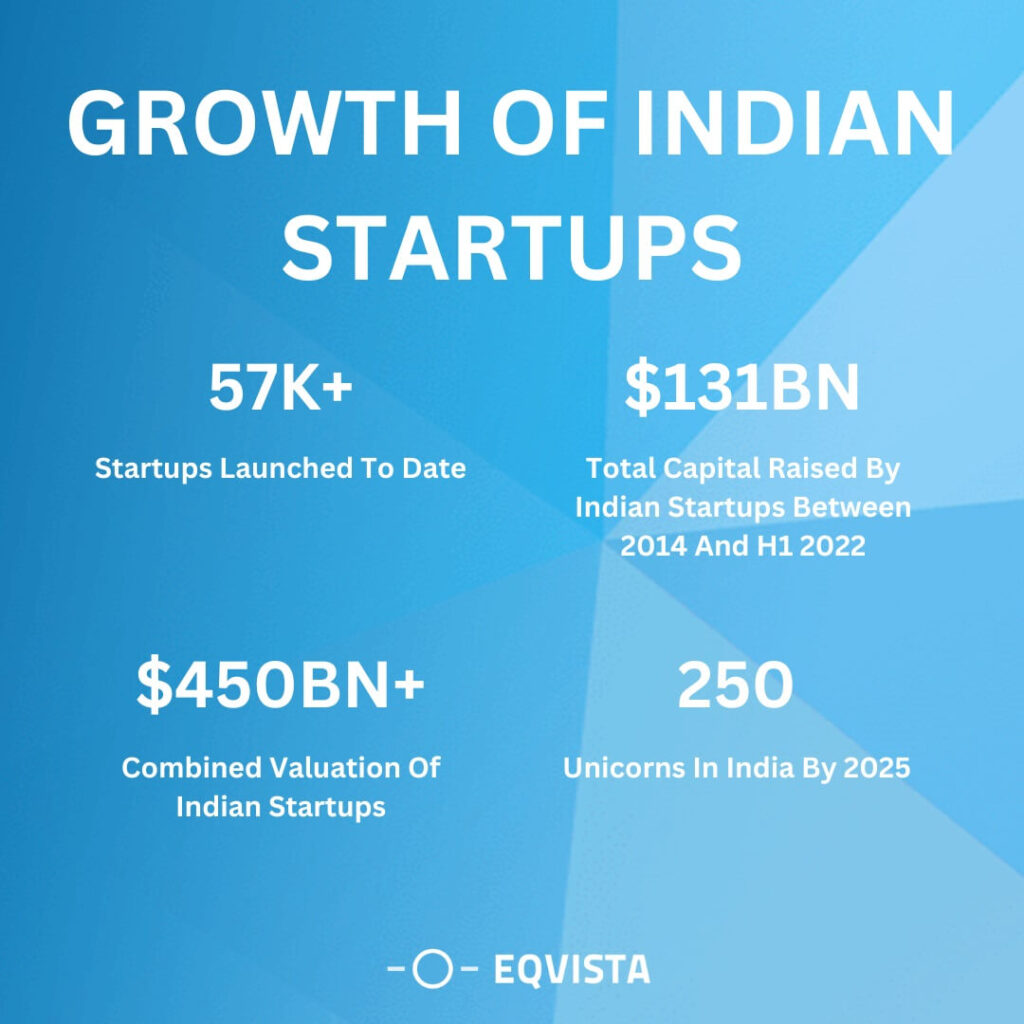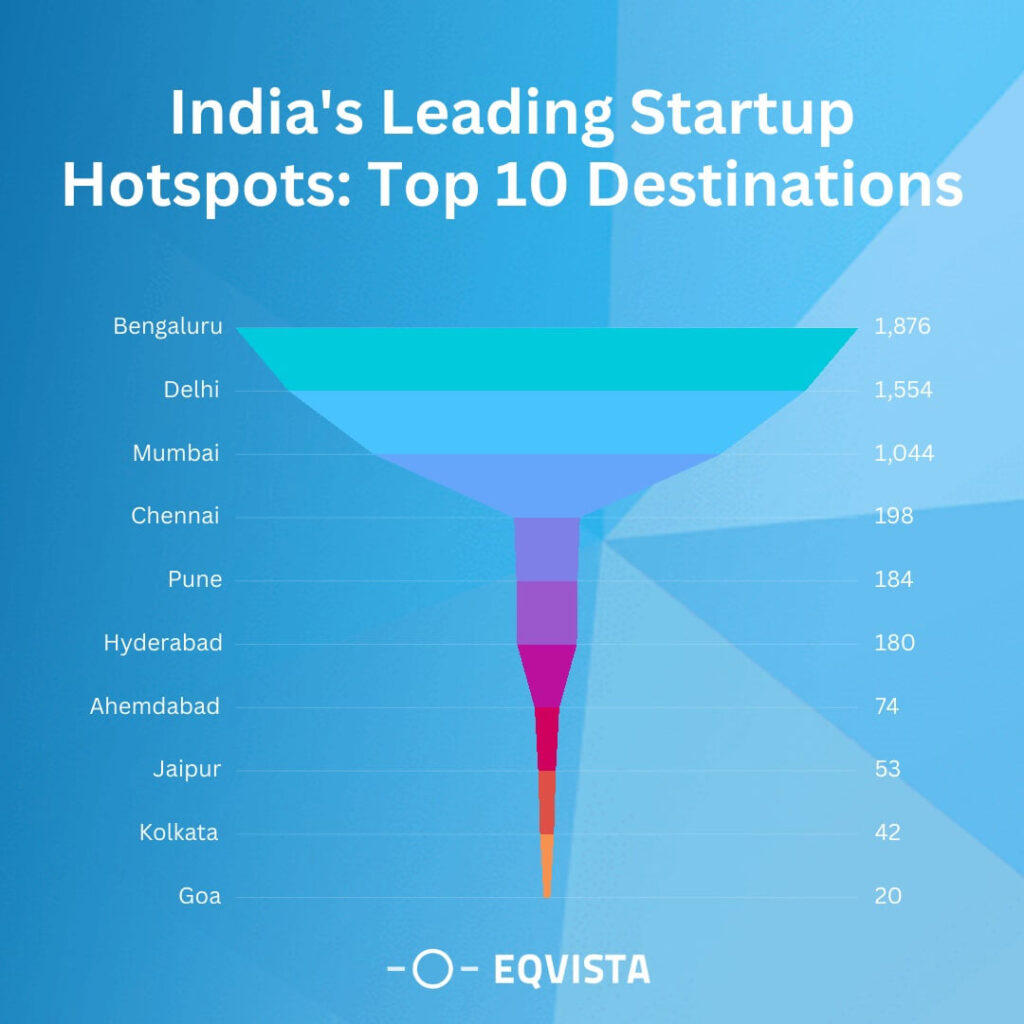The Startup Ecosystem in India: Trends, Challenges, and Opportunities for Entrepreneurs
This article aims at exploring the trends in the Indian Startup Ecosystem, Challenges and Opportunities for Indian Startups.
The startup environment in India has expanded significantly and provides a wealth of chances for business owners. However, entrepreneurs encounter hurdles in this dynamic market. India ranks third in the world’s startup ecosystem, nurturing more than 50,000 firms and experiencing 15% year-on-year growth.
Indian companies have attracted investments from all around the world because they are a hub of innovation and talented labor. This article aims at exploring the trends in the Indian Startup Ecosystem, Challenges Faced by Indian Startups, and Opportunities for Indian Startups.
The Startup Ecosystem in India
Private equity and venture capital organizations have made large investments in the Indian startup ecosystem. Venture capital and private equity spent more than INR 5.5 lakh crore in the recent past, promoting the expansion of India’s startup ecosystem. These investments have been crucial in fostering innovation across numerous industries and assisting entrepreneurs.

Importance Of Startups For Economic Growth And Job Creation
In India, startups are essential for generating economic growth and new jobs. The number of employment created by Indian startups, some of which have attained unicorn status was 1,92,427.
Startups have created almost 6 lakh employment in the last four years, demonstrating the expansion of the entrepreneurial culture in the nation. These job opportunities raise people’s economic well-being and lower unemployment rates.
Startups support economic growth by creating jobs, luring capital, fostering innovation, and raising exports and tax receipts, all of which promote the nation’s economic expansion.
Trends in the Indian Startup Ecosystem
Trends in the Indian startup ecosystem are continually changing and impacted by a variety of variables. It is adapting to new conditions and developing, with an emphasis on profitability, growth-stage investment, and emerging industries.
Investors are becoming more selective, looking for firms with solid fundamentals and a distinct path to success. The startup ecosystem in India has expanded significantly in recent years, establishing its position as one of the world’s quickest-emerging startup centers.

India presently has the world’s third-largest startup ecosystem, with over 99,000 recognized firms spread across 670 districts. Numerous variables, including this expansion, produced unicorns and a booming digital economy.
Increasing interest and investment in Indian startups
Recent years have seen a notable trend of rising interest and investment in Indian startups. The startup environment in India has expanded significantly, drawing both domestic and foreign investors. The rise of unicorns, the active involvement of HNIs and family offices, and supportive government measures can all be related to the increased interest and investment in Indian startups. These advancements suggest a promising future for the Indian startup ecosystem and its capacity for expansion and innovation.
Emergence of new industries and sectors
In recent years, India has experienced a tremendous trend with the introduction of new industries and sectors. India’s economy has advanced as a result of expansion and development in numerous industries. India’s industrial sector is also going through a tremendous transition. A stable political environment, pro-active industrial policies, and the vulnerability of the global supply chain are all helping India establish itself as a significant manufacturing alternative to China. Initiatives and reforms by the Indian government, along with favorable demographics and the digital revolution, are fueling the rise of the manufacturing sector.
Growth of AI and Machine Learning:
India’s startup ecosystem has witnessed a remarkable surge in the integration of artificial intelligence (AI) and machine learning technologies. As entrepreneurs explore opportunities in various sectors, the use of AI and ML has become a critical driver of innovation.
Startups are leveraging these technologies to address diverse challenges and seize new possibilities in sectors such as healthcare, finance, e-commerce, and more. The development of AI and ML in the Indian startup landscape brings both challenges and opportunities, making it essential for entrepreneurs to stay informed about the trends shaping this dynamic field.
Rise of unicorns and successful startup stories
In recent years, India has witnessed phenomenal growth in unicorns and successful startup tales. India has made a name for itself as one of the world’s largest hotspots for startups, and it features a wealth of motivating success tales. Here are some famous Indian unicorns and startup success stories.
- Swiggy – India has seen substantial growth in the popularity of the meal delivery service Swiggy. It gives individuals a practical option to order food from their preferred restaurants. The success of Swiggy demonstrates the expansion of the meal delivery market in India.
- Byju’s – Online learning programs are provided by Byju’s, an edtech business. It has developed into India’s top online learning platform, serving students of all ages. Byju’s success in providing high-quality education and its unique approach to education have boosted the company’s growth and market value.
Challenges Faced by Indian Startups
Starting a business in India can be a challenging endeavor. High taxes, strict labor laws, and bureaucratic hurdles in obtaining licenses and permits are just a few regulatory obstacles that startups must overcome. These obstacles make it difficult for startups to expand and scale their businesses, which can consume both valuable time and resources.
Lack of access to funding and capital
Access to capital is critical for companies seeking to expand and develop their operations. Even for early-stage firms with unproven business plans, attracting investment can be challenging. Stringent requirements with limited access to venture capital and angel investors provide difficulties for Indian entrepreneurs looking for funding.
Bureaucratic and regulatory hurdles
It can be extremely difficult for startups to navigate complicated regulatory frameworks and compliance requirements. Startups’ expansion and operation may be hampered by a lack of knowledge of the rules and protracted bureaucratic procedures.
Limited access to talent and skilled workforce
Startups in India face a lot of difficulty in finding competent and skilled employees. The demand for trained professionals frequently exceeds the available supply, making it challenging for startups to attract and retain the right staff.
Infrastructure and logistical challenges
The COVID-19 pandemic has affected India’s logistics industry, creating difficulties with demand forecasting, capacity planning, and product delivery. Companies can develop cutting-edge packaging and materials-handling procedures, minimize inventories, and adopt digital technology to address these concerns.
In addition, effective multimodal transit is available. India confronts infrastructure development hurdles due to historical issues such as slow speed, lack of money, environmental clearance issues, and inadequate contractors. To overcome these difficulties, the Indian government intends to accelerate and scale up infrastructure development.
Competition from established players
Competition from existing corporate giants in India is a big problem for new and smaller enterprises. However, there are tactics that startups can use to successfully compete with more well-known, established companies. Established corporations in industries are being challenged by newer competitors. This has prompted ambitious expansion initiatives and ground-breaking strategies, like providing dealers with free equipment.
Opportunities for Indian Startups
There are numerous and diversified business opportunities for startups in India. The Indian startup ecosystem is vibrant and active, with multiple sectors and industries providing opportunities for innovation, growth, and investment. Innovative business owners can make use of these chances to launch profitable companies and advance India’s economy by focusing on income generation and growth
Large and growing domestic market
India’s expanding domestic market presents major business and investment prospects. India has a population of more than 1.3 billion people, and its economy has grown significantly. Despite sluggish growth in recent years, the country’s GDP growth rate has averaged 6.83 %.
Despite this, India is a potential location for businesses and investors due to its amazing growth when compared to other nations. Economic liberalization, which has encouraged commerce and dismantled public monopolies since 1991, has supported the rise of India’s domestic market.
The country can now be open to both domestic and foreign firms because of this liberalization. India’s expanding population, domestic market, GDP, economic liberalization, and government initiatives present a number of business and investment prospects.
Favorable government policies and initiatives
Favorable government actions and policies have been essential in India in encouraging various industries and tackling major problems. Here are a few noteworthy projects.
- Reforms and Initiatives for Economic Growth – Concessional corporate tax rates, the National Infrastructure Pipeline, Atmanirbhar Bharat, and the Production-Linked Incentive program are just a few of the initiatives the government has put in place to assist economic growth and development.
- Initiatives for the Growth of Manufacturing – Prime Minister Narendra Modi announced the Make in India plan to increase manufacturing in India and position it as a worldwide hub. It places a focus on business accessibility, delicensing, contemporary infrastructure, talent development, and intellectual property protection.
Access to a large pool of tech talent and a skilled workforce
Technology-related businesses have benefited greatly from India’s access to a big pool of trained labor and tech talent. India is regarded as the top country in the world to find tech talent, and its tech sector has grown significantly in recent years. In the recent past, the tech sector in India had a talent pool of 3.8 million people or 80% of its total workforce of 4.7 million. With 2.14 million graduates per year, India has the second-highest supply of STEM graduates worldwide.
The nation places a strong focus on technical and scientific education, which results in a talented workforce. The availability of resources, STEM-trained labor, and other advantages make India’s IT sector a desirable location for businesses.
Potential for global expansion and market reach
India offers considerable potential for global growth and market penetration due to a number of factors. India has a sizable domestic market with its 1.3 billion inhabitants. According to research by the World Economic Forum, India has the potential to transform global value chains (GVCs) and establish itself as a center for manufacturing.
Supporting Ecosystem for Indian Startups
The startup ecosystem in India now serves as a key driver of innovation, economic growth, and job creation in the nation. The ecosystem as a whole is influenced by numerous drivers, obstacles, and pillars of support. An overview of the ecosystem that supports Indian startups is provided below.
Importance of networking and collaboration
In India’s professional environment, networking and collaboration are essential for encouraging growth, creativity, and mutual assistance between people and businesses. They promote the exchange of information, spur innovation, open up new commercial prospects, and act as a support system for people.
Professionals in India can increase their professional success and contribute to the general growth and development of their industries and the economy as a whole by actively participating in networking events, utilizing internet platforms, and developing collaborative ties.
Availability of funding and investment opportunities
India has a range of funding and investing options, including the PPF, a fixed-income program supported by the government with assured returns. The country draws impact from investors because of its huge consumer potential, adoption of digital technology, budgetary responsibility, and changing economic activity.
India is a desirable investment location due to its favorable demographics, promising economic outlook, and widespread usage of digital technology. It outpaced China by, receiving 5% of all VC funding and creating 23 unicorns. Deal volume saw a slight increase, especially in seed to series B deals.
Get a Valuation for Your Business From Eqvista!
The startup ecosystem in India is quickly changing, creating a welcoming atmosphere for business owners to launch and expand their operations. Complex rules and limited capital access are problems, but cash, skilled talent, and government initiatives present opportunities. Entrepreneurs in India may stimulate innovation, economic growth, and job creation by utilizing emerging trends and digital transformation. Calculations of business valuation are essential to every business. Eqvista offers business valuation services at an affordable and attractive price.
Interested in issuing & managing shares?
If you want to start issuing and managing shares, Try out our Eqvista App, it is free and all online!
